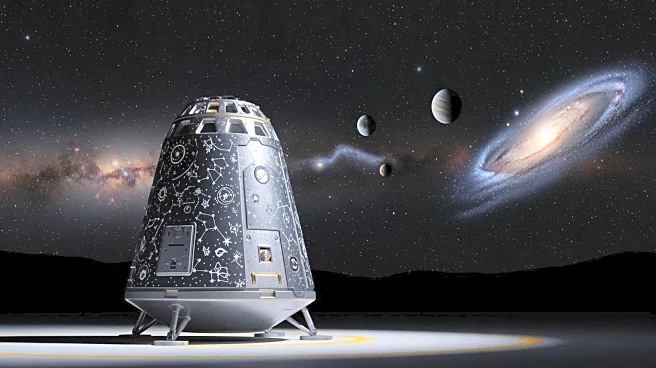What's Happening?
Celestis Inc., a Texas-based memorial spaceflight company, has announced plans to send human remains to Mars. The company has opened reservations for its Mars300 project, which aims to send canisters containing cremated ashes and DNA samples into orbit
around the Red Planet. The mission is planned as a secondary payload on a future Mars-bound spacecraft, with a tentative launch date set for 2030. Celestis has been offering space memorial services since 1997, sending remains of loved ones and notable figures into space. The Mars mission will cost $24,995 per participant, with payments held in a federally-insured trust account until launch details are confirmed.
Why It's Important?
This initiative by Celestis represents a novel intersection of space exploration and memorial services, potentially opening new avenues for honoring loved ones. The project underscores the growing commercial interest in Mars as a destination, aligning with broader efforts by companies like SpaceX to make interplanetary travel feasible. The mission also raises questions about planetary protection and the ethical implications of sending human remains to another planet. If successful, it could pave the way for more commercial ventures in space, impacting industries related to space travel, memorial services, and biotechnology.
What's Next?
Celestis plans to launch the Mars300 mission by 2030, contingent on securing a reliable launch provider, with SpaceX's Starship being a potential candidate. The company will need to address planetary protection protocols to ensure Mars' ecosphere is preserved. As the project progresses, it may prompt discussions among space agencies and regulatory bodies about the ethical and environmental considerations of such missions. Stakeholders in the space industry will likely monitor developments closely, as successful execution could influence future commercial space endeavors.
Beyond the Headlines
The Mars300 project highlights the cultural significance of space as a final frontier for human legacy. It reflects humanity's desire to extend its presence beyond Earth, intertwining scientific exploration with personal memorialization. The mission could also stimulate interest in space tourism and commercial space activities, potentially leading to new business models and partnerships. Ethical considerations regarding the preservation of extraterrestrial environments may become more prominent as such initiatives gain traction.
















